Previous - Spanish coins before euro
Spanish euro coins - catalog with values
Kingdom of Spain
Juan Carlos I (1975-2014) euro coinage (1999-2014)
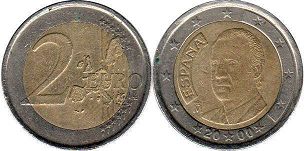
2 euro 2000 (1999-2006)
bi-metallic - nickel-brass/copper-nickel
2 EURO
ESPAÑA / 2000
Coin value ~ 3-4 USD
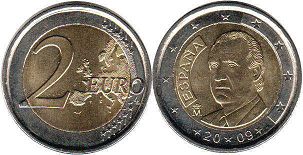
2 euro 2009 (2007-2009)
bi-metallic - nickel-brass/copper-nickel
2 EURO
ESPAÑA / 2009 / 4 stars on the platform
Coin value ~ 3-4 USD
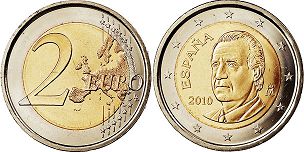
2 euro 2010 (2010-2014)
bi-metallic - nickel-brass/copper-nickel
2 EURO
ESPAÑA / 2010
Coin value ~ 3-4 USD
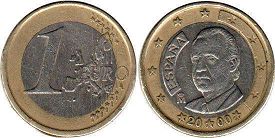
1 euro 2000 (1999-2006)
bi-metallic - nickel-brass/copper-nickel
1 EURO
ESPAÑA / 2000
Coin value ~ 2-3 USD
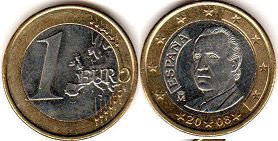
1 euro 2008 (2007-2009)
bi-metallic - copper-nickel/nickel-brass
1 EURO
ESPAÑA / 2008 / 4 stars on the platform
Coin value ~ 2-3 USD
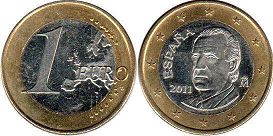
1 euro 2011 (2010-2014)
bi-metallic - copper-nickel/nickel-brass
1 EURO
ESPAÑA / 2011
Coin value ~ 2-3 USD
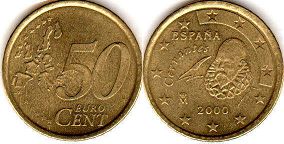
50 euro cent 2000 (1999-2006)
brass
50 EURO CENT
ESPAÑA CERVANTES 2000
Coin value ~ US$1
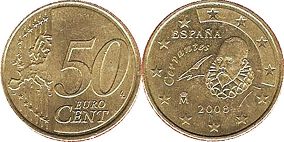
50 euro cent 2008 (2007-2009)
brass
50 EURO CENT
ESPAÑA CERVANTES 2008 / 4 stars on the platform
Coin value ~ US$1
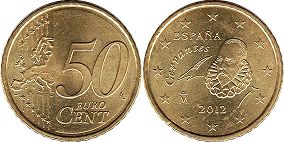
50 euro cent 2012 (2010- )
brass
50 EURO CENT
ESPAÑA CERVANTES 2012
Coin value ~ US$1
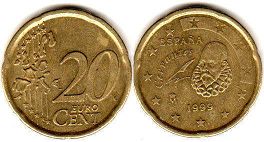
20 euro cent 1999 (1999-2006)
brass
20 EURO CENT
ESPAÑA CERVANTES 1999
Coin value < US$1
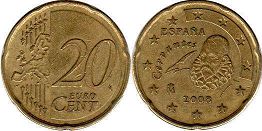
20 euro cent 2008 (2007-2009)
brass
20 EURO CENT
ESPAÑA CERVANTES 2008 / 4 stars on the platform
Coin value < US$1
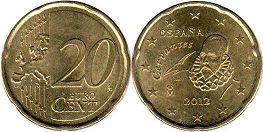
20 euro cent 2012 (2010- )
brass
20 EURO CENT
ESPAÑA CERVANTES 2012
Coin value < US$1
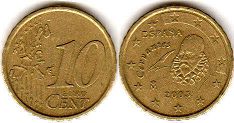
10 euro cent 2005 (1999-2006)
brass
10 EURO CENT
ESPAÑA CERVANTES 2005
Coin value < US$1
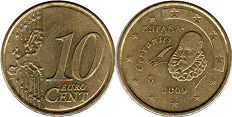
10 euro cent 2009 (2007-2009)
brass
10 EURO CENT
ESPAÑA CERVANTES 2009 / 4 stars on the platform
Coin value < US$1
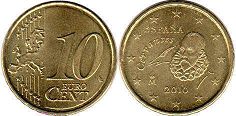
10 euro cent 2010 (2010- )
brass
10 EURO CENT
ESPAÑA CERVANTES 2010
Coin value < US$1
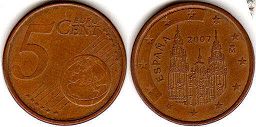
5 euro cent 2007 (1999-2009)
copper plated steel
5 EURO CENT
ESPAÑA 2007 / 4 stars on the platform
Coin value < US$1
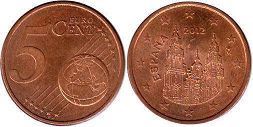
5 euro cent 2012 (2010- )
copper plated steel
5 EURO CENT
ESPAÑA 2012
Coin value < US$1
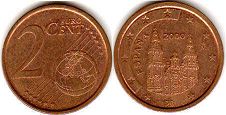
2 euro cent 2000 (1999-2009)
copper plated steel
2 EURO CENT
ESPAÑA 2000 / 4 stars on the platform
Coin value < US$1
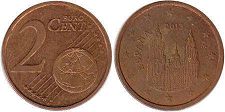
2 euro cent 2013 (2010- )
copper plated steel
2 EURO CENT
ESPAÑA 2013
Coin value < US$1

1 euro cent 2007 (1999-2009)
copper plated steel
1 EURO CENT
ESPAÑA 2007 / 4 stars on the platform
Coin value < US$1

1 euro cent 2012 (2010- )
copper plated steel
1 EURO CENT
ESPAÑA 2012
Coin value < US$1
Philipp VI (since 2014)
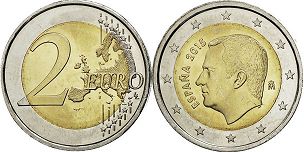
2 euro 2015 (2015- )
bi-metallic - nickel-brass/copper-nickel
2 EURO
ESPAÑA / 2015
Coin value ~ 3-4 USD
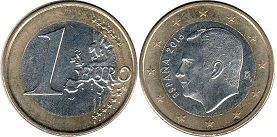
1 euro 2016 (2015- )
bi-metallic - copper-nickel/nickel-brass
1 EURO
ESPAÑA 2016
Coin value ~ 2-3 USD
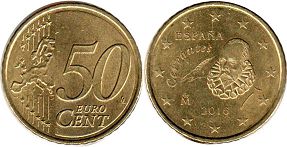
50 euro cent 2016 (2010- )
brass
50 EURO CENT
ESPAÑA CERVANTES 2016
Coin value ~ US$1
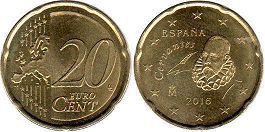
20 euro cent 2016 (2010- )
brass
20 EURO CENT
ESPAÑA CERVANTES 2016
Coin value < US$1
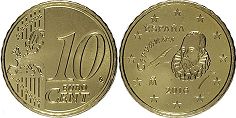
10 euro cent 2016 (2010- )
brass
10 EURO CENT
ESPAÑA CERVANTES 2016
Coin value < US$1
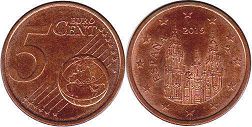
5 euro cent 2015 (2010- )
copper plated steel
5 EURO CENT
ESPAÑA 2015
Coin value < US$1
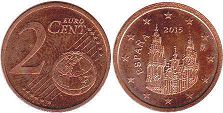
2 euro cent 2015 (2010- )
copper plated steel
2 EURO CENT
ESPAÑA 2015
Coin value < US$1

1 euro cent 2016 (2010- )
copper plated steel
1 EURO CENT
ESPAÑA 2016
Coin value < US$1
Euro coins of other countries
AndorraAustria
Belgium
Croatia
Cyprus
Estonia
Finland
France
Germany
Greece
Italy
Ireland
Latvia
Lithuania
Luxembourg
Malta
Monaco
Netherlands
Portugal
San Marino
Slovakia
Slovenia
Vatican
Costs of Spanish euro coins in this catalog approximate and indicated specifically for the coin shown in the picture.
I do not buy or sell coins - this is just a catalog.

